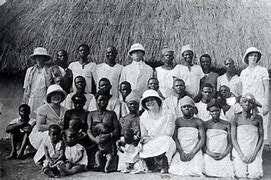T h e t e r m ‘colony’ originally meant a settlement of immigrants in a foreign land. In the political sense, a colony is either
a settlement of the subjects of a nation or state beyond its own
frontiers; or a territorial unit geographically separated from it,
but owing allegiance to it. In modern colonial history, two types
of colonies have grown up, owing in the m ain to climatic conditions. There is the ‘settlement 5 colony in which climate and
geographical environment have favoured the establishment of
sizeable European com m unities; while the others, regarded
formerly, before the discovery of prophylactic drugs and the
clearance of jungles, as inimical to the health of Europeans,
usually gathered relatively small groups of business men,
administrators, soldiers and missionaries, all of whom lived in an
environment quite different from that of the ‘m other’ country.
These two different forms of colony have been responsible for
the evolution of different systems of government. In fact, there
has been no uniform system of colonial government in Africa.
The pattern has varied according to the policy and traditions of
the different colonial powers, as well as to the existence and size
of a settler community.
France, the colonial power which ruled over the largest area
of territory in Africa, followed a policy of assimilation aim ed at
producing an elite class. She hoped by introducing a favoured
class of Africans to French culture and civilization and raising
them to the status of Frenchmen, to avoid the rise of African
nationalism in the territories under her rule. The class of elites,
however, always rem aimed relatively small, and outside it the
bulk of the Africans rem aimed ‘subjects’, to be exploited and
m all treated at the will of on-the-spot Frenchman en, both high and low



No comments yet
Be the first to share your thoughts!